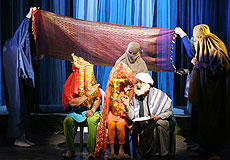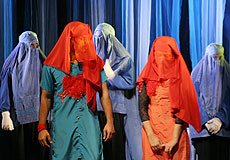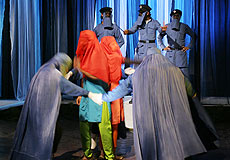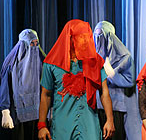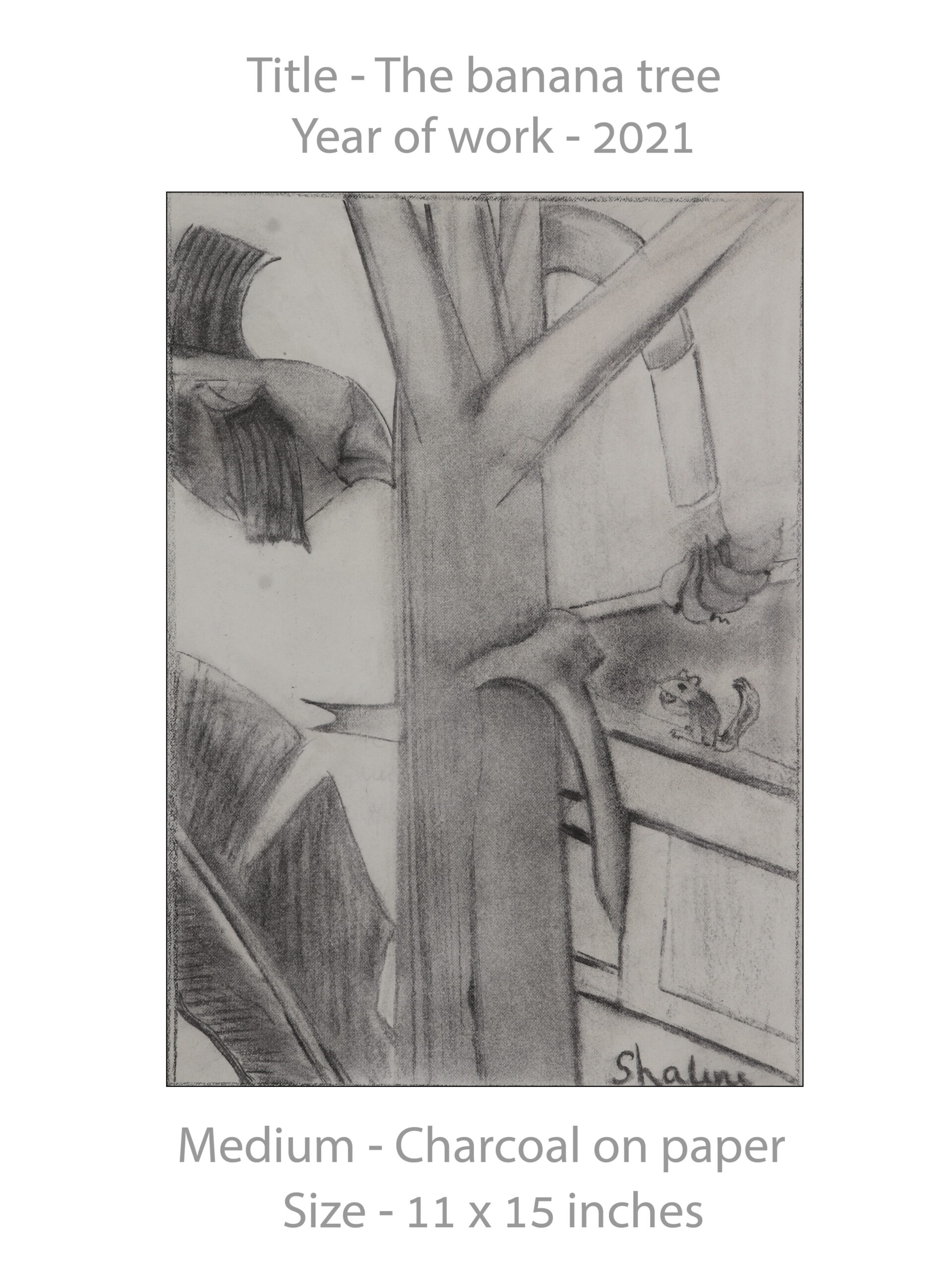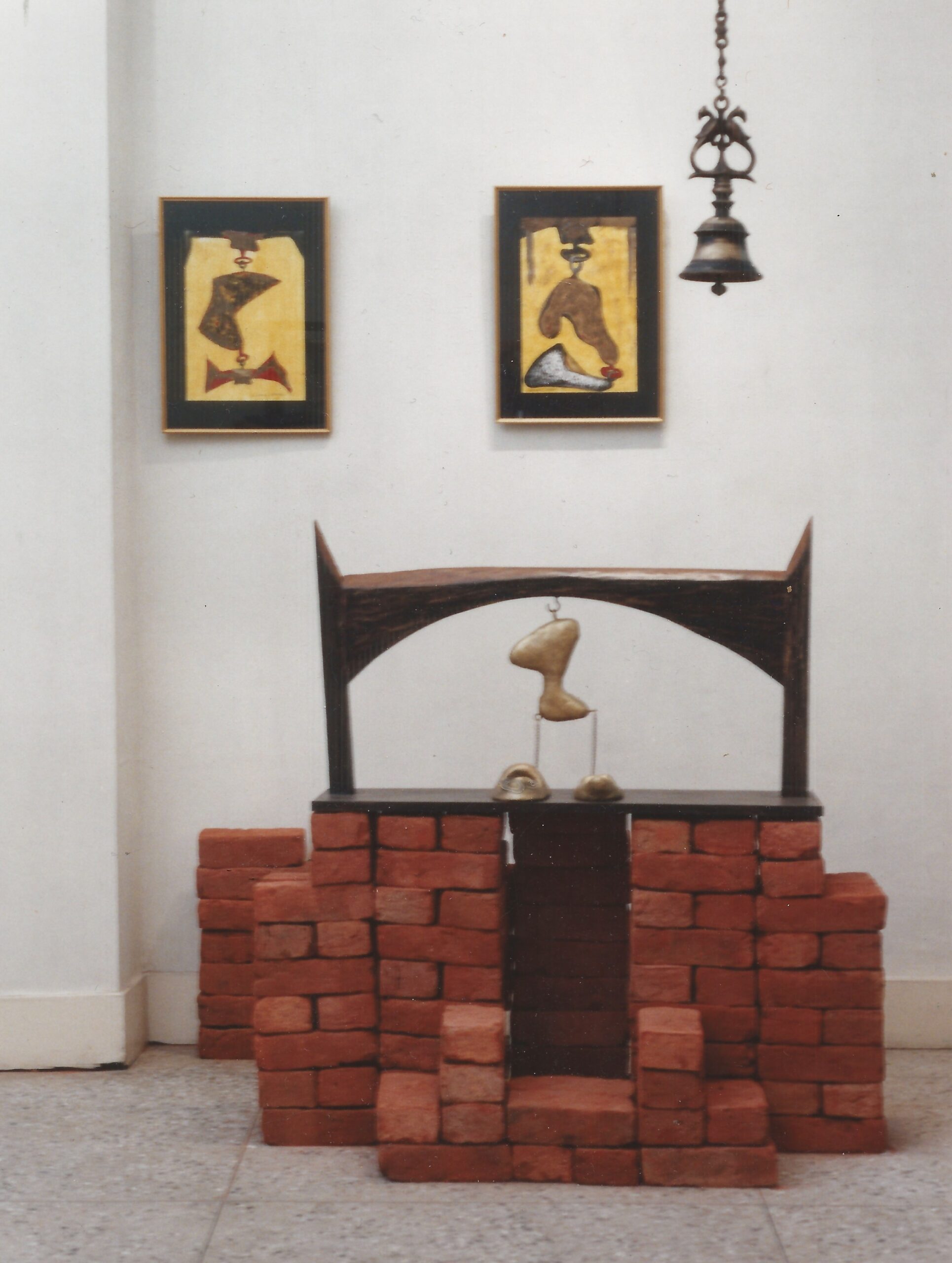Burqavaganza – Banned in Pakistan staged in BHARANGAM – Compiled by Manohar Khushalani
At the recently concluded BHARANGAM, the Theatre Fest organized by the National School of Drama, a Pakistani play, Burqavaganza, produced by Ajoka Theatre Group, was staged at Kamani Auditorium, New Delhi. The play had been banned in Pakistan last year, because of its irreverence to the Burqa, a traditional veil and gown worn by conservative Muslim women. The play is especially relevant and contemporary because the controversy over women covering either their head with a Hijab or also their face and the whole body with aBurqa rages even in the Muslim majority countries which were known for their secular ideals.
For example, Hijab, an obligatory code of dress in Islam, was banned in public buildings, universities, schools and government buildings in Muslim-majority Turkey shortly after a 1980 military coup. Prime Minister of Turkey, Recep Tayyip Erdogan (whose wife and daughters are veiled) had promised before his first electoral victory in 2002 that the “unfair ban” would be abolished. Turkey’s ruling Justice and Development Party (AKP) and the far-right Nationalist Action Party (MHP) opposition party have thrashed out a deal on a compromise head-cover to be allowed on campus after decades of an all-out ban. Under the deal agreed to by the two parties, a day earlier, women at universities are permitted to cover their heads by tying the headscarf in the traditional way beneath the chin.
While the Turkish PM insists that respect for basic human rights is his sole motivation in pushing through the amendments, some believe that the move would cause immense problems and deal a blow to the separation of state and religion, one of the founding principles of the modern Turkish Republic.
Told in a rollickingly funny mode, Burqavaganza laughs at the pointless rigidity of customs and dress code and ridicules the system that upholds their sanctity. The play follows the story of the young lovers: the progress of their romance, the wedding and the birth of the first child. Meantime, the police, looking for the terrorist leader Bin Batin, and the Burqa Brigade who suspect that their Burqas are too colourful and revealing constantly bicker because of their conflicting agendas. An unveiling ceremony follows where the Minister for Burqa Affairs makes a passionate speech about the significance of the Burqa and everyone celebrates with song and dance.
The charismatic scholar Hijab Hashmi inspires her devotees to keep their eyes open for the traitors in the Burqa Brigade. Bin Batin carries on his bloody fight against the helmet-covered enemy .The stage action is accompanied by telecast of ‘Burqavision’ programmes which include a soap, a documentary ‘Burqa Though the Ages’, News, Sports, a fashion show and ‘Breaking News’. While Burqas of all shapes and sizes create images and situations reminding the audience of the socio-political situation in Pakistan, two maulanas sitting on the edges of the stage, in a TV show, respond to the questions from their viewers about apparently important questions about interpretation and application of religious teachings. The statements of the maulanas are in fact extracts from ‘Beheshti Zaiver’, a book given to girls at the time of their marriage.
Denouncing the ban on the play Madiha Gauhar had then said that the ban was imposed because of pressure from the “burqa brigade”, and that it proved that the government’s enlightened moderation policies were a farce. It was in the early eighties that I had first met Madiha, when I was hanging around with Badal Sircar, Ragini Prakash and Vinod Dua at the Sri Ram Centre Canteen in New Delhi. We were told by Mrs. Acharya, the owner of the canteen, that a Pakistani actress wanted to meet us. We were accosted by this strapping young and beautiful lady who told Badal Sircar that their group had performed his play Juloos (Procession) in Pakistan despite the censorship. A little later, Shahid Nadeem with his Ajoka Theatre Group, performed with our group, Theatre Union, at JNU. Shahid even recorded our play Toba Tek Singh and took it back with him to Pakistan.
Set up by a small group of cultural activists in 1983, during General Zia-ul-Haq’s politically and culturally repressive regime, Ajoka has struggled with determination against very heavy odds to produce socially meaningful art. It has addressed vital, sometimes taboo subjects through its hard-hitting and innovative productions. Committed to the ideals of peace and tolerance within Pakistan and in the neighbouring regions, it has frequently collaborated with theatre activists from other countries of South Asia particularly from India, viz. Indian directors such as Badal Sircar, Safdar Hashmi, Anuradha Kapur and Kewal Dhaliwal.
Founder-playwright of Ajoka Theatre, Shahid Nadeem, known for his commitment to human rights and peace, is the author of more than 35 original plays and several adaptations. His plays have been performed in Pakistan, India, USA, UK, Norway, Bangladesh, Nepal, Iran and Oman. He is currently the Director of PTV Academy; and Co-director of Panjpaani Indo-Pak Theatre Festival, a festival pioneering interaction between theatre activists of India and Pakistan. He has also worked as Communications Officer of Amnesty International, based in London and Hong Kong. He was awarded Feuchtwanger/Getty fellowship in 2001 and has lectured at various universities in the US.
(Sources: Islam Online/NSD/Reuters/ANI)
Cast and Credits
Minister/ Bin Batin/ Chambeli/ Cameraman: Sarfraz Ansari
Maulana 1: Ziafat Arfat
Maulana 2: Imran-ul-Haq
Haseena: Samiya Mumtaz
Khoobroo: Furqaan Majid
Brigade Commander: Khola qurashi
Brigade 1: Asif Japani
Brigade 2: Azaan Malik
Police Officer: Usman Zia
Constable 1: Shahid Zafar
Constable 2: Shehzad
Chorus/Dancers: Taqoob Masih, Nadeem Abbas, Waseem Luka, Meena
Hijab Hashmi/ Mother: Samina Butt
Guitar Player: Vicky
Play and Direction: Shahid Nadeem
Sets and Lighting Design: Kewal Dhaliwal
Music: M Aslam
Costume: Zahra Batool
Assistant Director: Malik Aslam
Production Manager: Imran-ul-Haq
Research: Ziafat Arfat
Video recording / editing: Nadeem Mir, Shakeel Siddiqui



